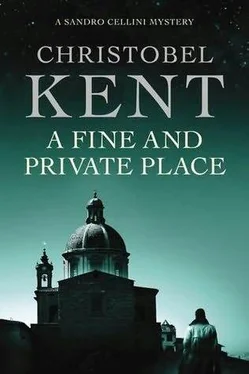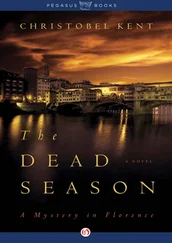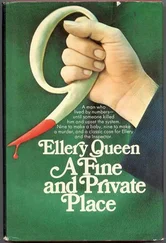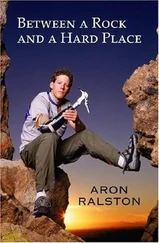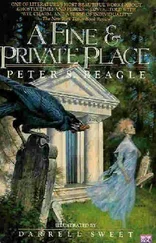Christobel Kent - A fine and private place
Здесь есть возможность читать онлайн «Christobel Kent - A fine and private place» весь текст электронной книги совершенно бесплатно (целиком полную версию без сокращений). В некоторых случаях можно слушать аудио, скачать через торрент в формате fb2 и присутствует краткое содержание. Год выпуска: 2011, ISBN: 2011, Издательство: Macmillan, Жанр: Криминальный детектив, на английском языке. Описание произведения, (предисловие) а так же отзывы посетителей доступны на портале библиотеки ЛибКат.
- Название:A fine and private place
- Автор:
- Издательство:Macmillan
- Жанр:
- Год:2011
- ISBN:9781429970808
- Рейтинг книги:4 / 5. Голосов: 1
-
Избранное:Добавить в избранное
- Отзывы:
-
Ваша оценка:
- 80
- 1
- 2
- 3
- 4
- 5
A fine and private place: краткое содержание, описание и аннотация
Предлагаем к чтению аннотацию, описание, краткое содержание или предисловие (зависит от того, что написал сам автор книги «A fine and private place»). Если вы не нашли необходимую информацию о книге — напишите в комментариях, мы постараемся отыскать её.
A fine and private place — читать онлайн бесплатно полную книгу (весь текст) целиком
Ниже представлен текст книги, разбитый по страницам. Система сохранения места последней прочитанной страницы, позволяет с удобством читать онлайн бесплатно книгу «A fine and private place», без необходимости каждый раз заново искать на чём Вы остановились. Поставьте закладку, и сможете в любой момент перейти на страницу, на которой закончили чтение.
Интервал:
Закладка:
Ginevra the cook had once expressed surprise that Cate didn’t commute from home, if she didn’t want to live in; she was of a generation for which it would be entirely natural for a twenty-nine-year-old unmarried woman to live with her parents — or, in her case,mother and stepfather — even if it meant a long drive to work. But Cate, who had spent most of her teenage years arguing with the stubborn, old-fashioned man her worn-out mother had married when Cate’s father left them, had not lived at home now for more than ten years. She had worked on the cruise ships off the Florida coast, restaurants on the Côte d’Azur, even a coffee bar in Bath, England, but this place — the Castello Orfeo, two hours’ drive from where she’d been born — sometimes seemed the most foreign of them all.
And this morning more than most, Cate was wondering whether the fact was, she simply didn’t belong here. Had this been coming a long time? Perhaps; the winter season was certainly harder going than the summer; the guests wondering what they were doing in the middle of nowhere, in the cold and the rain; this wasn’t the Italy they’d signed up for. But yesterday had been a tough one; yesterday everything had seemed to turn sour. Yesterday, nothing had gone right.
On a sharp, wooded bend the convex mirror that discreetly marked the rear entrance to the castle came into view. Cate turned across the bend between the trees and revved to get the little Vespa over the stones and rubble of the rear access road. Visitors and guests were not encouraged to use this route, though it represented a considerable shortcut: there was no view, no avenue of trees, no framing of the castle’s lovely, forbidding profile, and the terrain was rough. This way, one approached through a gloomy thicket of overgrown holm-oak trees, and the flank of the castle loomed up quite suddenly overhead.
There was a small clearing in the trees marked by a flagpole where the staff’s assorted vehicles were parked, out of sight, and Cate dismounted and pushed her moped into the space unofficially reserved for her. Down to her right was the laundry building, and the studio apartment, where the curtains were firmly drawn; it would be a while before that one was up. In her pocket, her mobile tinkled its merry little ringtone. Vincenzo.
She tugged off her helmet and set the mobile to her ear. ‘V’cenz. Caro .’
They hadn’t been together so long; five months. He’d met her in the late-night supermarket in Pozzo where he worked, buying herselfsome beers on the way back to the bedsit she rented over a biker bar. Vincenzo was younger, by a year or two, and he had led a quiet life. He looked at Cate and she knew he saw a girl who had travelled the world, who had earned her independence, who drank beer on her own late at night; his eyes shone when he looked at her. He was sweet, mostly.
‘Yeah,’ she said, in response to his question. ‘Just arrived. Fine, yeah, I’m fine.’
She’d told him her troubles last night, and he was looking out for her, that was all, even if it felt oppressive. Turning to register that the gardener’s pick-up was parked in its usual place, she said, ‘Mauro’s back.’
Vincenzo was on the early shift and she knew he’d be at the till, between customers; he wanted to know if he could see her tonight, making his case. Really what he wanted, Cate knew, was to move in with her; she let him talk, looking around her absently. If the pick-up was evidence, then the surly Mauro, factotum, handyman and gardener, had returned — to the Director’s fury, he’d spent all yesterday helping a farmer haul cattle out of a stream on the other side of the valley. But something was different; she didn’t yet know what it was. The phone wedged under her ear as Vincenzo talked, Cate opened the shiny box on the moped’s rear and pulled out the bulging canvas satchel she took to work. Her fingers felt like frozen sausages, even inside the gloves.
‘OK, darling,’ she said gently, ‘tonight, should be great. Can I call you though? Got to get inside, I’m freezing. Un bacio , OK ? Un bacio .’ Grumbling, he let her go, and Cate hurried under the trees towards the castle.
Even though it was six months since she had started at Orfeo, Cate still did not quite understand its principles. Between five and ten guests arrived every ten weeks, all — or almost all — single people, and all creative people of one kind or another. You could have described them as artists, Cate supposed, but while she always thought of artists as painters or sculptors, Orfeo’s guests might be poets or writers of novels or plays, or they might make tiny indistinct objects out of feathers and clay or compose operas using the sounds of underwater creatures.
Whatever they did, they were disposed around the place, accommodated in the castle’s apartments and outbuildings for those tenweeks, fed and watered; they were entertained, now and again, with expeditions here and there, to galleries or churches, or by visiting speakers. Cate had always assumed they were here to work, but some of them seemed to do nothing at all, and certainly no proof of achievement was ever demanded of them. Put frankly, Cate knew nothing about art. And this lot — well. They were an alien species to her. But then again — a couple of Americans, an English novelist, a Norwegian poet — Cate reflected, as she headed round the walls for the castle kitchen, that wasn’t so surprising. They were foreign.
There were often a couple of Italians too — although this time only one, and as he was from Venice he was exotic enough to a girl from the landlocked plains of the Val di Chiana — but even they were supposed to conduct every conversation in English, the castle’s official language. The Norwegian and the young American woman, who both wanted to improve their language skills, occasionally tried to engage the staff and the Italian guests in their own language, but it was frowned upon. Cate couldn’t find fault with the house language rule, because it was the reason she, an outsider, had been brought in. Her English, and her calm, quiet way with funny foreigners, learned on the cruise ships. But this rule, like so many others, was weird; it made the place like a strange kind of island state among the lonely hills. In fact, what Orfeo seemed most like to Cate sometimes, with its prohibitions and punishments, its smiling, implacable headmistress, was a boarding school, or a prison.
The kitchen and dining room were housed in the old stable block that clung to the rear of the castle, its blind side, and there was a staff entrance in the wall that enclosed the complex, then a small stretch of close-cropped lawn. The vents from the room that housed the castle’s heating system were billowing steam, and the grass was crunchy with frost under her heavy boots. The door to the kitchen was ajar. Cate heard the voices and she stopped, her bag slung over her shoulder, her breath clouding in front of her, and listened.
There were too many voices, and they were raised too high. The Director didn’t like racket, particularly not Italian racket. Cate had been brought in after a kitchen girl — waitress was too modern a word, it seemed, for the castle’s image, everything had to have the mediaevaltouch — had muttered something rude in Italian to an American woman. Not even a guest, but a guest’s wife, visiting for the evening. The girl had been dismissed; apparently she’d shouted across her shoulder all the way out, her rough, defiant Tuscan accent resounding around the courtyard.
So it was unusual to hear this kind of clamour of heedlessly raised voices; even if there was a row — and there were plenty — it would without fail be conducted in a kind of hissing, spitting, under-the-breath mode. So: something had happened.
Читать дальшеИнтервал:
Закладка:
Похожие книги на «A fine and private place»
Представляем Вашему вниманию похожие книги на «A fine and private place» списком для выбора. Мы отобрали схожую по названию и смыслу литературу в надежде предоставить читателям больше вариантов отыскать новые, интересные, ещё непрочитанные произведения.
Обсуждение, отзывы о книге «A fine and private place» и просто собственные мнения читателей. Оставьте ваши комментарии, напишите, что Вы думаете о произведении, его смысле или главных героях. Укажите что конкретно понравилось, а что нет, и почему Вы так считаете.
